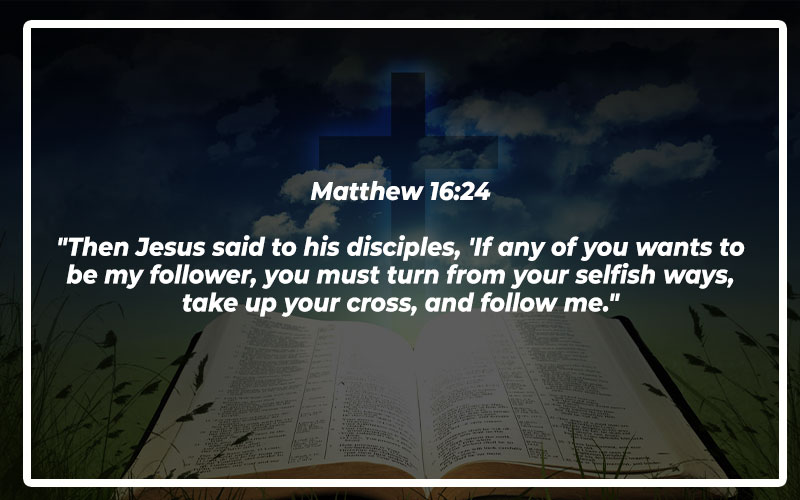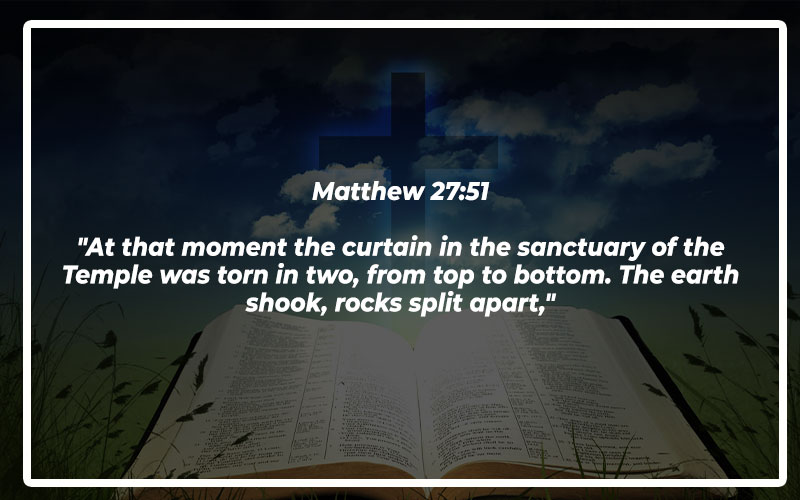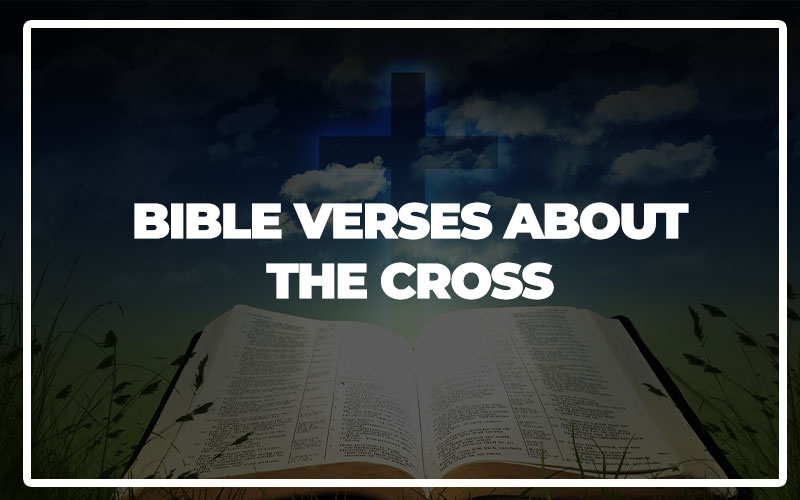Have you ever wondered why the cross is so important to Christians? The cross is a powerful symbol of God’s love and sacrifice.
It reminds us of Jesus Christ, who gave His life for us. In the Bible, we find many verses that talk about the cross and what it means for our faith.
These verses help us understand the depth of God’s love and the amazing grace He offers through Jesus’ sacrifice.
Below are important Bible verses about the cross.
Also Read: Bible Verses to Get Closer to God
Top Bible Verses About The Cross
Matthew 16:24
“Then Jesus said to his disciples, ‘If any of you wants to be my follower, you must turn from your selfish ways, take up your cross, and follow me.”

This verse emphasizes the commitment and sacrifice required to follow Jesus. It signifies the need to abandon selfish ambitions and fully embrace the challenges and responsibilities that come with discipleship.
Luke 9:23
“Then he said to the crowd, ‘If any of you wants to be my follower, you must give up your own way, take up your cross daily, and follow me.'”
Luke 9:23 highlights the daily dedication required in following Christ. It’s a continuous process of self-denial and embracing the path Jesus laid out, reflecting a life of constant surrender and obedience.
1 Corinthians 1:18
“The message of the cross is foolish to those who are headed for destruction! But we who are being saved know it is the very power of God.”
This verse underscores the paradox of the cross. While it may seem irrational to those who don’t believe, it embodies the transformative power and wisdom of God for those who are saved.
Galatians 2:20
“My old self has been crucified with Christ. It is no longer I who live, but Christ lives in me. So I live in this earthly body by trusting in the Son of God, who loved me and gave himself for me.”
Galatians 2:20 speaks of a profound spiritual transformation. Through the crucifixion, believers experience a death to their old selves, allowing Christ to live through them, demonstrating a life of faith and love.
Philippians 2:8
“He humbled himself in obedience to God and died a criminal’s death on a cross.”
This verse highlights the humility and obedience of Jesus, who willingly endured the shame and suffering of the cross. It exemplifies the ultimate sacrifice and submission to God’s will.
Colossians 2:14
“He canceled the record of the charges against us and took it away by nailing it to the cross.”
Colossians 2:14 illustrates the legal and spiritual debt that was paid through Jesus’ crucifixion. By nailing our sins to the cross, He offers complete forgiveness and reconciliation with God.
1 Peter 2:24
“He personally carried our sins in his body on the cross so that we can be dead to sin and live for what is right. By his wounds you are healed.”
This verse emphasizes the sacrificial nature of Jesus’ death. By bearing our sins, He provides a path to righteousness and spiritual healing, demonstrating His immense love and mercy.
Hebrews 12:2
“We do this by keeping our eyes on Jesus, the champion who initiates and perfects our faith. Because of the joy awaiting him, he endured the cross, disregarding its shame. Now he is seated in the place of honor beside God’s throne.”
Hebrews 12:2 encourages believers to focus on Jesus, who endured the cross for the joy set before Him. His triumph over the cross exemplifies the ultimate victory and serves as a model of faith and perseverance.
John 19:17
“Carrying the cross by himself, he went to the place called Place of the Skull (in Hebrew, Golgotha).”
This verse portrays the solitary burden Jesus bore as He carried His cross to Golgotha. It reflects His resolve and the weight of the sacrifice He was about to make for humanity’s redemption.
Mark 15:21
“A passerby named Simon, who was from Cyrene, was coming in from the countryside just then, and the soldiers forced him to carry Jesus’ cross. (Simon was the father of Alexander and Rufus.)”
Mark 15:21 introduces Simon of Cyrene, who was compelled to carry Jesus’ cross. This act symbolizes the participation in Jesus’ suffering and the shared journey of bearing the cross.
Matthew 27:32
“Along the way, they came across a man named Simon, who was from Cyrene, and the soldiers forced him to carry Jesus’ cross.”
Similar to Mark 15:21, this verse highlights the role of Simon of Cyrene in helping Jesus carry the cross. It serves as a reminder of the communal aspect of bearing burdens and the support found within the body of Christ.
John 19:19
“And Pilate posted a sign on the cross that read, ‘Jesus of Nazareth, the King of the Jews.'”
John 19:19 details the inscription placed on Jesus’ cross by Pilate. This sign, intended as a mockery, ironically proclaimed the truth of Jesus’ kingship, reinforcing His divine identity and mission.
Matthew 27:40
“‘Look at you now!’ they yelled at him. ‘You said you were going to destroy the Temple and rebuild it in three days. Well then, if you are the Son of God, save yourself and come down from the cross!'”
This verse captures the mocking and disbelief of the onlookers at the crucifixion. Their taunts reflect the misunderstanding of Jesus’ mission and the true purpose of His sacrificial death on the cross.
Luke 23:33
“When they came to a place called The Skull, they nailed him to the cross. And the criminals were also crucified—one on his right and one on his left.”
Luke 23:33 describes the moment of Jesus’ crucifixion alongside two criminals. This scene underscores the humility and identification of Jesus with sinners, fulfilling His role as the Savior of all.
John 19:30
“When Jesus had tasted it, he said, ‘It is finished!’ Then he bowed his head and gave up his spirit.”
This powerful verse marks the completion of Jesus’ mission on the cross. “It is finished” signifies the fulfillment of God’s redemptive plan, offering salvation to humanity through Jesus’ sacrificial death.
Mark 15:37
“Then Jesus uttered another loud cry and breathed his last.”
Mark 15:37 records the final moments of Jesus’ life on the cross. His loud cry and last breath signify the profound significance of His sacrifice and the culmination of His earthly ministry.
Also Read: Bible Verses About Living For God
Luke 23:46
“Then Jesus shouted, ‘Father, I entrust my spirit into your hands!’ And with those words he breathed his last.”
Luke 23:46 highlights Jesus’ trust and surrender to the Father in His final moments. This act of faith and commitment exemplifies the perfect submission and reliance on God’s will, even in death.
Matthew 27:50
“Then Jesus shouted out again, and he released his spirit.”
This verse in Matthew reiterates Jesus’ final moments on the cross, emphasizing His voluntary act of releasing His spirit. It signifies the completion of His sacrificial work and the transition to the next phase of God’s plan.
John 19:25
“Standing near the cross were Jesus’ mother, and his mother’s sister, Mary (the wife of Clopas), and Mary Magdalene.”
John 19:25 depicts the presence of Jesus’ loved ones at the foot of the cross. Their presence underscores the human connections and emotional depth of the crucifixion event, highlighting the support and sorrow of those who followed Him.
Mark 15:32
“‘Let this Messiah, this King of Israel, come down from the cross so we can see it and believe him!’ Even the men who were crucified with Jesus ridiculed him.”
This verse captures the mockery Jesus faced from onlookers and even those crucified alongside Him. Their demands for miraculous proof of His identity reflect a misunderstanding of His mission and the nature of His kingship.
Matthew 27:54
“The Roman officer and the other soldiers at the crucifixion were terrified by the earthquake and all that had happened. They said, ‘This man truly was the Son of God!'”
Matthew 27:54 reveals the transformative impact of Jesus’ crucifixion on the Roman soldiers. Their recognition of His divine identity in the midst of extraordinary events highlights the profound truth of who Jesus is.
Luke 23:42-43
“Then he said, ‘Jesus, remember me when you come into your Kingdom.’ And Jesus replied, ‘I assure you, today you will be with me in paradise.'”
This exchange between Jesus and the repentant thief on the cross exemplifies the promise of salvation and grace. Jesus’ assurance of paradise to the thief underscores His mercy and the hope available to all who believe.
John 19:28
“Jesus knew that his mission was now finished, and to fulfill Scripture he said, ‘I am thirsty.'”
John 19:28 highlights Jesus’ awareness of the completion of His mission. His expression of thirst fulfills prophecy and underscores His humanity and suffering on the cross, aligning with God’s redemptive plan.
Matthew 27:45
“At noon, darkness fell across the whole land until three o’clock.”
This verse describes the supernatural darkness that covered the land during Jesus’ crucifixion. It signifies the gravity and cosmic significance of His death, marking a pivotal moment in history.
Mark 15:29-30
“The people passing by shouted abuse, shaking their heads in mockery. ‘Ha! Look at you now!’ they yelled at him. ‘You said you were going to destroy the Temple and rebuild it in three days. Well then, save yourself and come down from the cross!'”
Mark 15:29-30 captures the scorn and disbelief of the crowd. Their mocking remarks reflect a misunderstanding of Jesus’ prophetic words and the true purpose of His sacrifice, revealing the hardness of human hearts.
Luke 23:34
“Jesus said, ‘Father, forgive them, for they don’t know what they are doing.’ And the soldiers gambled for his clothes by throwing dice.”
In this verse, Jesus’ plea for forgiveness for His executioners exemplifies His boundless compassion and mercy. It highlights the essence of His message of love and forgiveness, even in the face of cruelty and injustice.
John 19:26-27
“When Jesus saw his mother standing there beside the disciple he loved, he said to her, ‘Dear woman, here is your son.’ And he said to this disciple, ‘Here is your mother.’ And from then on this disciple took her into his home.”
John 19:26-27 illustrates Jesus’ care and concern for His mother and beloved disciple even in His final moments. This act of entrusting them to each other underscores the importance of community and support within the body of Christ.
Matthew 27:51
“At that moment the curtain in the sanctuary of the Temple was torn in two, from top to bottom. The earth shook, rocks split apart,”

This verse describes the tearing of the temple curtain, symbolizing the removal of the barrier between God and humanity. It signifies the new access to God made possible through Jesus’ sacrificial death on the cross.
Mark 15:39
“When the Roman officer who stood facing him saw how he had died, he exclaimed, ‘This man truly was the Son of God!'”
Mark 15:39 highlights the Roman centurion’s recognition of Jesus’ divine identity at the moment of His death. This acknowledgment from a Gentile soldier signifies the universal impact and truth of Jesus’ sacrifice.
Luke 23:47
“When the Roman officer overseeing the execution saw what had happened, he worshiped God and said, ‘Surely this man was innocent.'”
This verse emphasizes the centurion’s realization of Jesus’ innocence and divinity. His response of worship underscores the profound revelation and acknowledgment of the truth of who Jesus is.
John 19:31
“It was the day of preparation, and the Jewish leaders didn’t want the bodies hanging there the next day, which was the Sabbath (and a very special Sabbath, because it was Passover week). So they asked Pilate to hasten their deaths by ordering that their legs be broken. Then their bodies could be taken down.”
John 19:31 provides context for the urgency to remove the bodies from the crosses before the Sabbath. This verse highlights the intersection of Jewish customs and the significance of Jesus’ death occurring during Passover, symbolizing the ultimate sacrificial lamb.
Matthew 27:58
“He went to Pilate and asked for Jesus’ body. And Pilate issued an order to release it to him.”
This verse describes Joseph of Arimathea’s request for Jesus’ body. His actions demonstrate courage and devotion, ensuring Jesus received a proper burial and fulfilling prophecies about His death and burial.
Luke 23:50-53
“Now there was a good and righteous man named Joseph. He was a member of the Jewish high council, but he had not agreed with the decision and actions of the other religious leaders. He was from the town of Arimathea in Judea, and he was waiting for the Kingdom of God to come. He went to Pilate and asked for Jesus’ body. Then he took the body down from the cross and wrapped it in a long sheet of linen cloth and laid it in a new tomb that had been carved out of rock.”
These verses detail Joseph of Arimathea’s role in Jesus’ burial. His righteousness and anticipation of God’s kingdom led him to honor Jesus in death, providing a dignified burial that fulfilled prophecies and demonstrated his faith and respect for Jesus.
Also Read: Bible Verses About Being A Man of God
What Does the Bible Say About The Cross
The cross is one of the most powerful symbols in Christianity, representing love, sacrifice, and redemption. In the Bible, the cross is the place where Jesus Christ, the Son of God, gave His life for humanity. This act of sacrifice is central to the Christian faith because it demonstrates the depth of God’s love for His people.
The cross was originally an instrument of torture and execution used by the Romans. It was a symbol of shame and punishment. However, Jesus transformed its meaning by willingly enduring the cross for the sake of humanity. His death on the cross was not just a physical suffering but a spiritual one. He took upon Himself the sins of the world, offering Himself as a perfect sacrifice to reconcile humanity with God.
This selfless act on the cross signifies the ultimate expression of love. It shows that God’s love is so immense that He was willing to endure the greatest pain and humiliation to save us. The cross also represents the forgiveness of sins. Through Jesus’ sacrifice, believers are offered a path to forgiveness and a restored relationship with God.
The message of the cross is one of hope and victory. Jesus’ death was not the end but the beginning of new life. His resurrection three days later demonstrated His power over death and confirmed His divinity. For Christians, the cross is a reminder that no matter how dark the situation, there is hope and salvation through Jesus Christ.
In daily life, the cross encourages believers to live selflessly and love others deeply. It calls Christians to take up their own crosses, meaning to live sacrificially and follow Jesus’ example. The cross is a symbol that continues to inspire and guide believers, reminding them of the incredible love and sacrifice that lies at the heart of their faith.

